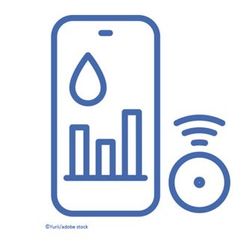© 2025 MJH Life Sciences™ , Patient Care Online – Primary Care News and Clinical Resources. All rights reserved.
Diabetes and Mentall Illness: 3 New Studies
Results include: The metabolic dangers of neuroleptic Rx in youth; prevalence of T2DM in minorities with severe mental illness; and gaps in care for mentally ill with T2DM.

People with severe mental illness, eg, schizophrenia and bipolar disorder, have an increased risk of developing type 2 diabetes (T2DM) and have poorer health outcomes than those with diabetes alone. Three new studies highlight the risks for these patients:
- Antipsychotic medications increase risk of diabetes among young patients
- Persons with severe mental illness are more than twice as likely to have T2DM; risks even higher for African American and Hispanic patients
- Diabetes healthcare and disease self-management are suboptimal in diabetes patients who have severe mental illness.
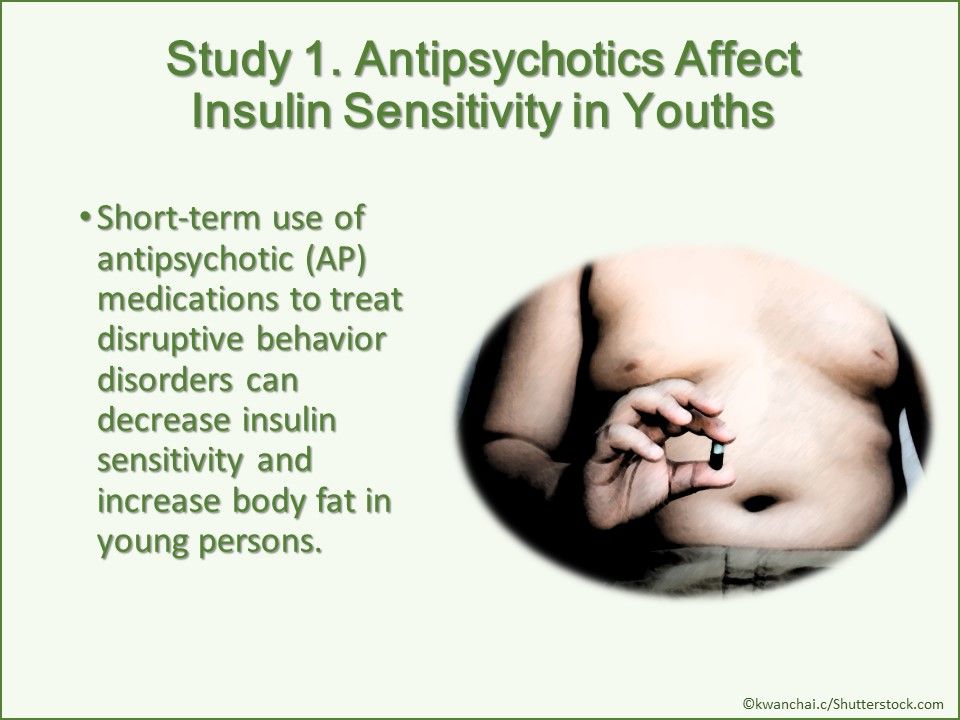
Study 1. Short-term treatment with antipsychotic medications commonly prescribed off-label to treat nonpsychotic disorders associated with disruptive behavior, such as attention deficit hyperactivity disorder, in youths can decrease the body’s sensitivity to insulin and increase body fat.
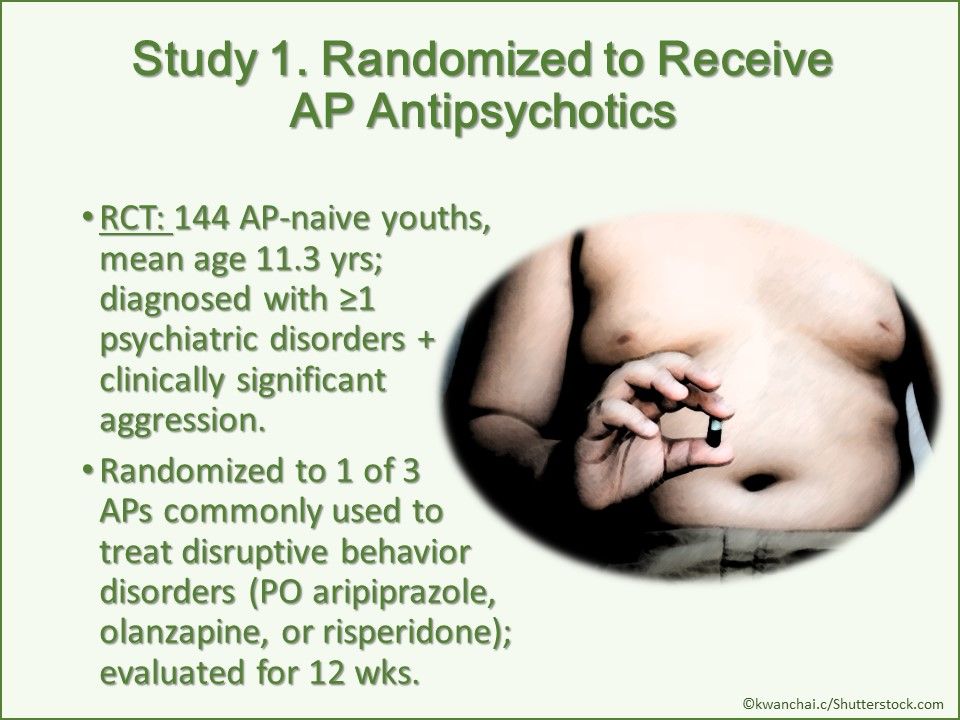
Study 1. A randomized clinical trial recruited 144 antipsychotic-naive youths, mean age 11.3 years, who were diagnosed with 1 or more psychiatric disorders and clinically significant aggression. The patients were randomized to 1 of 3 antipsychotics (oral aripiprazole, olanzapine or risperidone) commonly used in children with disruptive behavioral disorders and then evaluated for 12 weeks.
From baseline to week 12, insulin-stimulated change in glucose rate of disappearance increased by 2.3% for risperidone and decreased by 29.34% for olanzapine and 30.26% for aripiprazole, with no significant difference across medications. This primary measure of insulin sensitivity decreased significantly during 12 weeks in the pooled study sample.
Percentage total body fat increased by 1.18% on risperidone, 4.12% on olanzapine, and 1.66% on aripiprazole and was significantly greater for olanzapine than risperidone or aripiprazole.
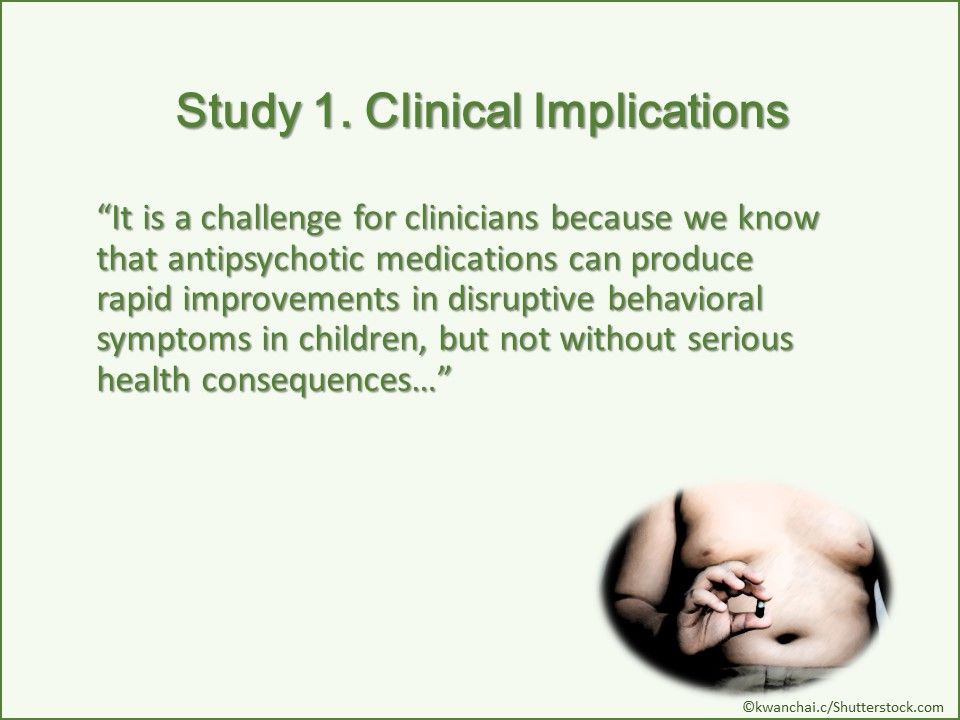
Clinical Implications: “It is a challenge for clinicians because we know that antipsychotic medications can produce rapid improvements in disruptive behavioral symptoms in children, but not without serious health consequences…” it is time to really hit the brakes on the common first-line use of these medications in children with nonpsychotic behavior disorders and to implement more consistent frontline use of behavioral treatment options that are available and effective,” said principal investigator and senior author John W. Newcomer, MD, who is a psychiatrist and a professor of integrated medical science in Florida Atlantic University’s Charles E. Schmidt College of Medicine.
For more details: Nicol BE, Yingling MD, Flavin KS, et al. Metabolic effects of antipsychotics on adiposity and insulin sensitivity in youths: a randomized clinical trial. JAMA Psychiatry. Published online June 13, 2018. doi:10.1001/jamapsychiatry.2018.1088
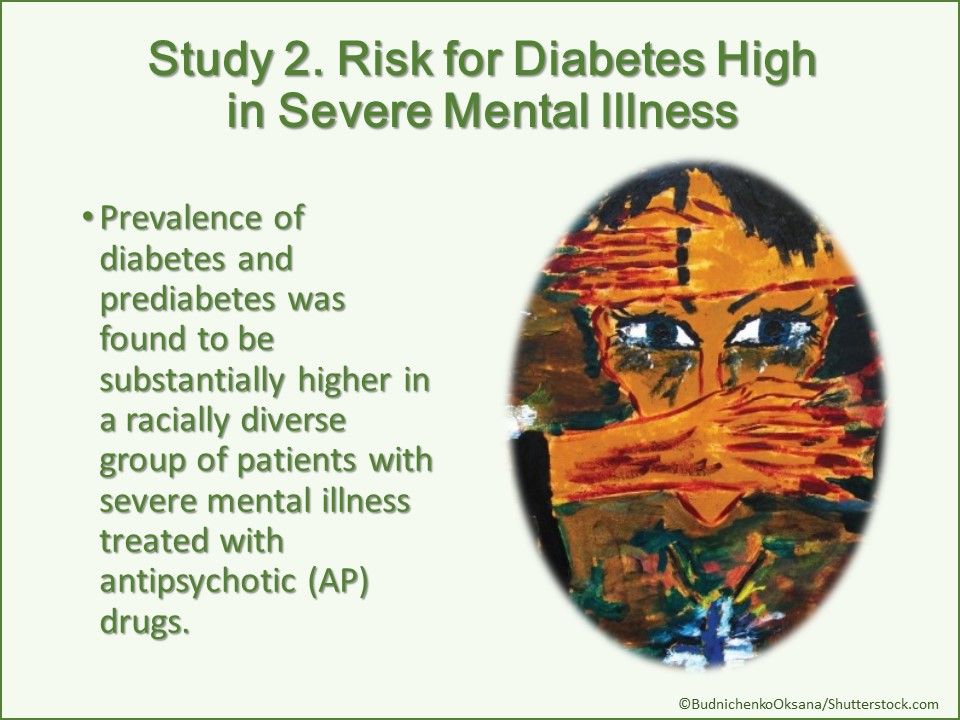
Study 2. The first large cohort study examining laboratory-confirmed diabetes and prediabetes prevalence in a racially and ethnically diverse sample of antipsychotic-treated patients with severe mental illness shows these patients have substantially higher rates of T2DM than in the general population.
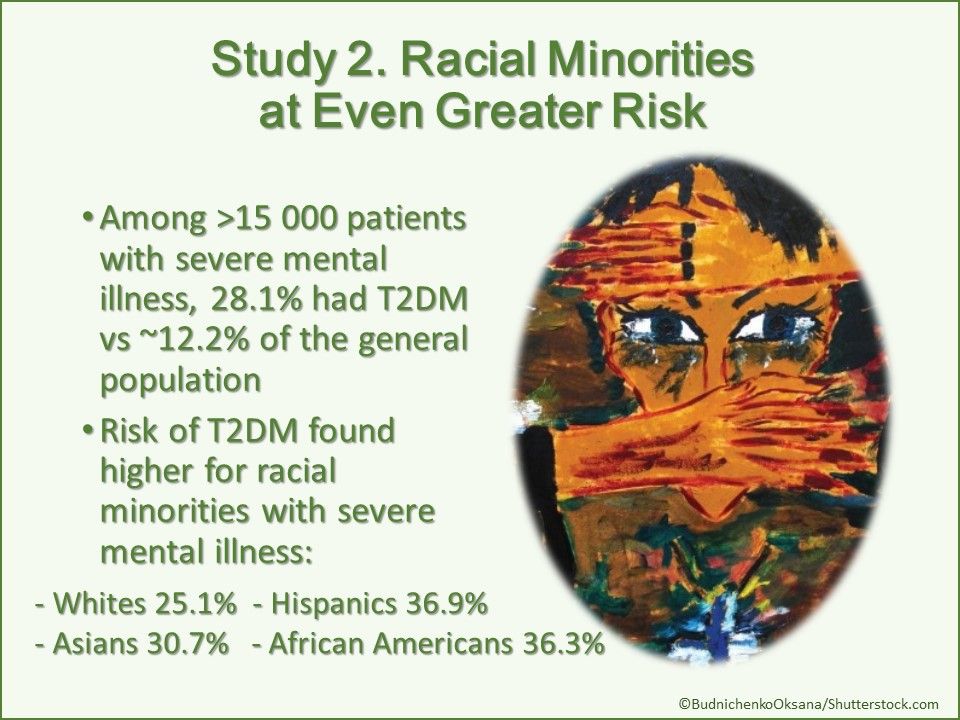
Study 2. In the study, among more than 15,000 patients with severe mental illness, 28.1% had T2DM. An estimated 12.2% percent of the general population has the disease. The risk is also higher for racial minorities with severe mental illness. The incidences of T2DM were 36.9% for Hispanics, 36.3% for African Americans, and 30.7% Asians versus 25.1% for whites.
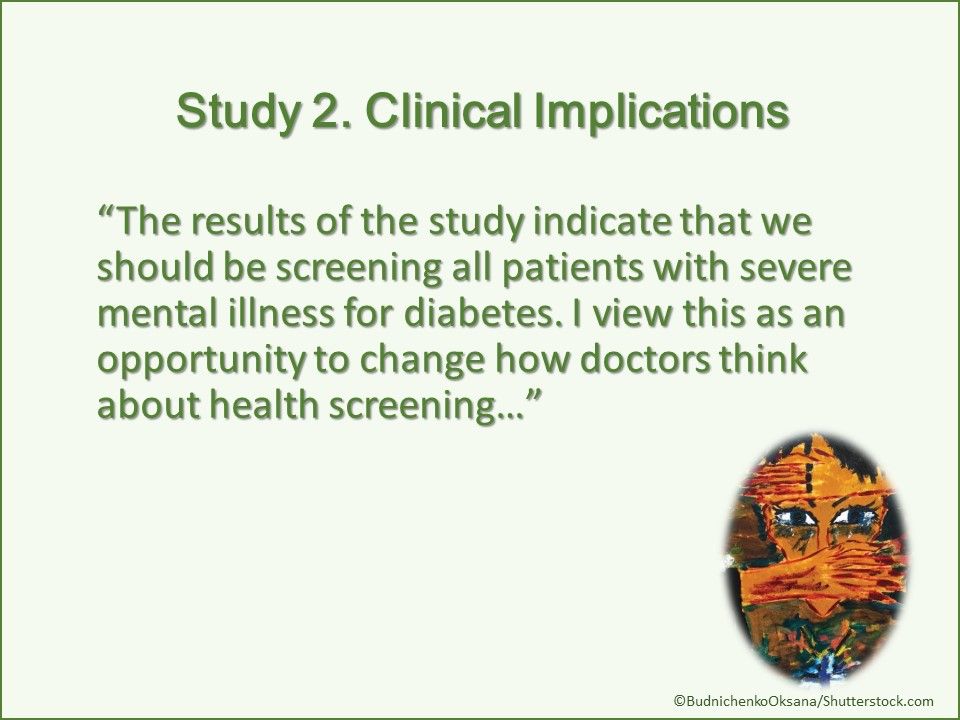
Clinical Implications. “The results of the study indicate that we should be screening all patients with severe mental illness for diabetes. I view this as an opportunity to change how doctors think about health screening and to help prevent diabetes. By diagnosing prediabetes early, we can help patients make lifestyle modifications or start medicine so that they don't develop diabetes,” said lead author Christina Mangurian, MD, associate professor of psychiatry at University of California San Francisco.
For more details: Mangurian CV, Schillinger D, Newcomer JW, et al. Diabetes and prediabetes prevalence by race and ethnicity among people with severe mental illness. Diabetes Care. 2018 Jun 13. pii: dc180425. doi: 10.2337/dc18-0425.
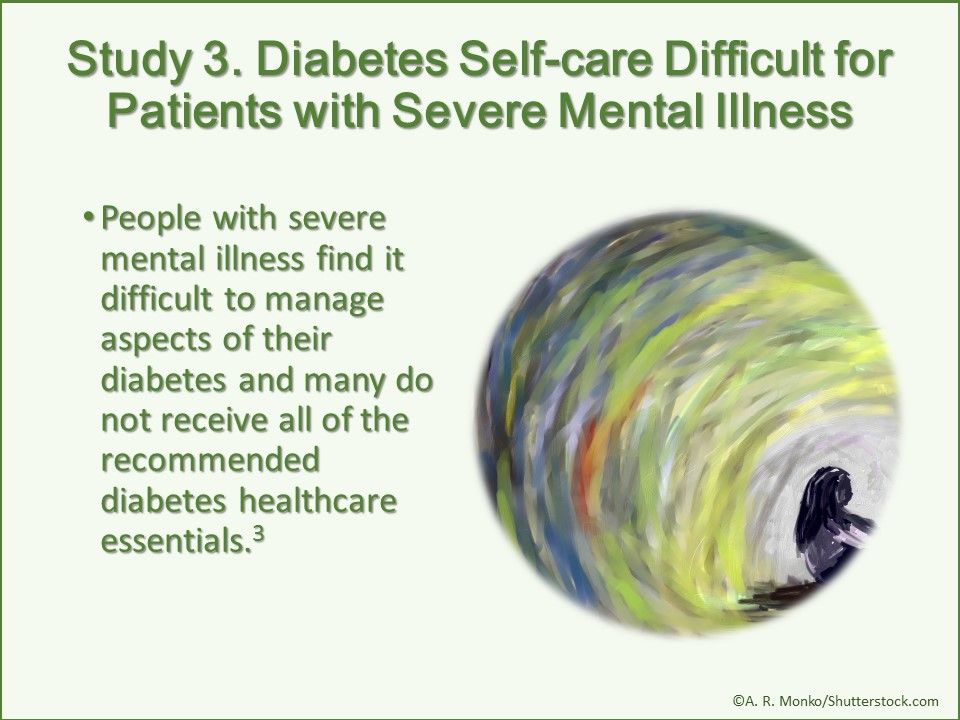
Study 3. People with severe mental illness find it difficult to manage aspects of their diabetes and many do not receive all of the recommended diabetes healthcare essentials.
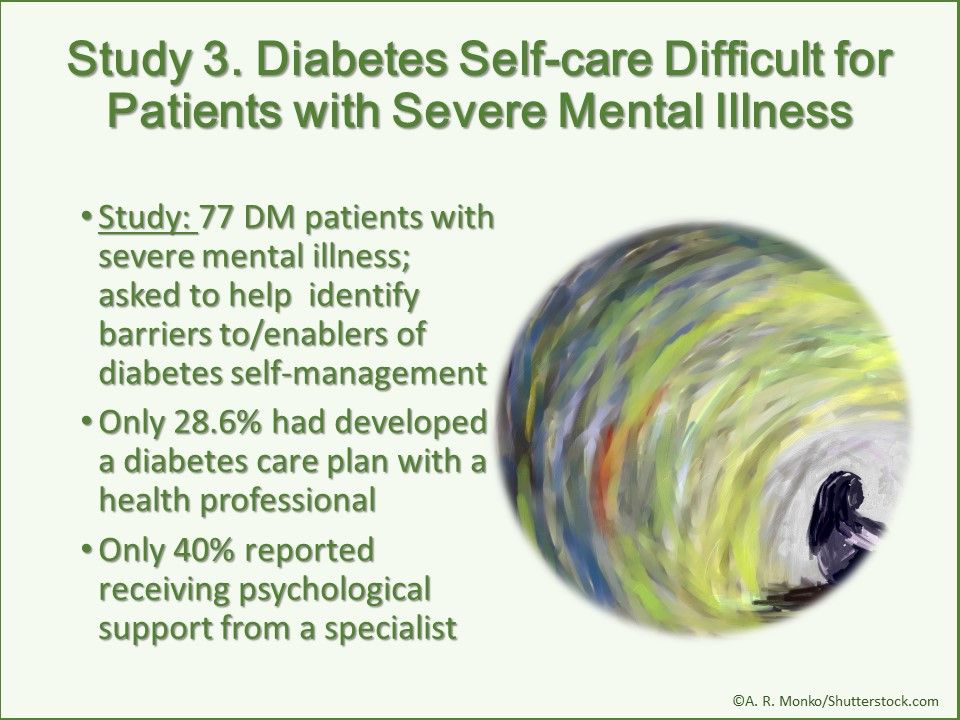
Study 3. Although the participants reported taking medication regularly in the previous week, other behaviors were less frequent. They ate a general diet on 4.1 days and a specific diet on 3.6 days, exercised on 2.4 days and checked their feet on 1.7 days. Finding time for regular exercise and following a healthy diet was particularly difficult, they reported.
When asked which other people they perceived as helping with management of their diabetes, more than two-thirds (69%) agreed that primary care staff helped them to manage their diabetes; agreement was lower for diabetes specialists (49%) and their mental health team (35%) and only 30% felt friends and family helped them to manage their diabetes.
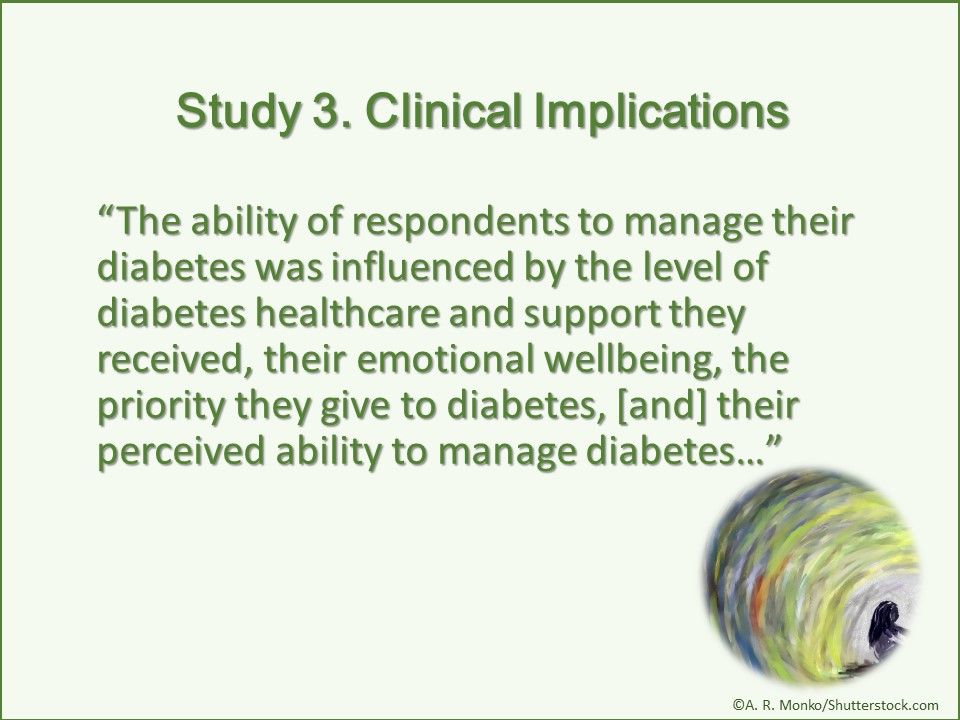
Clinical Implications. “The ability of respondents to manage their diabetes was influenced by the level of diabetes healthcare and support they received, their emotional wellbeing, the priority they give to diabetes, their perceived ability to manage diabetes or establish a routine to do so and the perceived consequences of their diabetes management. The development and evaluation of tailored interventions that address these areas are needed to help improve diabetes self-management support for people with severe mental illness,” stated the researchers led by Kathleen Mulligan of the School of Health Sciences, City, University of London, London, UK.
For more details: Mulligan K, McBain H, Lamontagne-Godwin F, et al. Barriers to effective diabetes management - a survey of people with severe mental illness. BMC Psychiatry 2018 Jun 1;18(1):165. doi: 10.1186/s12888-018-1744-5.

